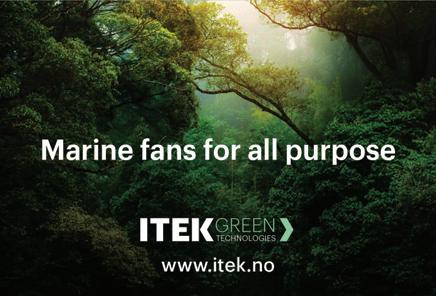







Vow and its subsidiaries Scanship, CH Evensen and ETIA are passionate about preventing pollution. The company’s world leading solutions convert biomass and waste into valuable resources and generate clean energy for a wide range of industries. Scanship, Vow’s cruise division, provides innovative systems to convert waste into clean energy and purified water, meeting the highest international discharge standards. Any residuals from the processes can be recovered, recycled, or reused.
Hamid Gorbani is VP Sales, Maritime Solutions, for Scanship. He explained to Hannah Barnett how this ground-breaking technology works.
Scanship has been a pioneer in its sector of the cruise industry for decades, thanks to its innovative mindset and the drive to constantly develop and improve its processes for minimising pollution in all forms. The latest development is within Pyrolysis systems for processing waste.

“When we established our wastewater treatment system in early 2000, it was a significant development,” Mr Gorbani recalled. “Today we are the market leader
when it comes to fitting out newbuilds and retrofitting existing vessels with waste and wastewater treatment systems.”
Scanship has technology onboard cruise ships sailing on every ocean. The holding company’s reach does not stop at the coast; public utilities and industries use its solutions for sludge processing, waste and plastic management, and gas production. It also has a presence in other autonomous sites like ports, airports and offshore platforms. The company ethos


is to bring an end to waste and stop pollution to enable a truly sustainable circular economy.
All Scanship systems are supplied in full compliance with IMO – MARPOL and furnished with all necessary approvals. In 2003 the company was one of the first in the world to obtain an Alaska-approved advanced wastewater system and the first to obtain approval for the new IMO MARPOL 227(64) special area in the Baltic Sea in 2013.

The company was awarded a contract with the Finnish shipyard for the delivery of a pyrolysis system to be installed on the most recent newbuild for Royal Caribbean International. This is set to be the largest cruise ship in the world when it enters operation late in 2023.
Mr Gorbani emphasised the dedicated research and development that went into the technology and was enthusiastic about its potential.
“The pyrolysis technology that we developed and deployed for this vessel is ground-breaking,” he said. “When the vessel will enter operation, it will be the first of its kind and considered as the flagship. We are extremely proud of being part of this cooperation.”
In order for the company to function and to win large contracts like this, cooperation at every point in the supply chain is essential. “Suppliers and clients are extremely important to us,” Mr Gorbani said. “We have a very experienced and dedicated team within Scanship, who work to constantly improve relations with manufacturers and suppliers. We are in regular dialogue with the installation
companies too – Understanding how they can support us and how we can be a stronger team together.
“In this way, we can give the best support to our clients to help them improve their ship operations. I believe that success is always built on a foundation of trust, good communication and understanding the client´s needs. This applies to the downstream value chain as well.”
But how does this innovative technology work?
Pyrolysis is a technology based on heat treatment with absence of oxygen, where the feedstock is converted into burnable gases and biochar, Mr Gorbani explained.
Scanship currently has three different technology solutions in its portfolio consisting of Microwave Assisted Pyrolysis (MAP), the Spirajoule heated induction screw and the CH Evensen Rotary Kiln.





The latter is mainly designed for large scale industry.
The generated Pyrogas from the process is a combination of energy-rich gases such as hydrogen, methane and other burnable gases, all handled in a dedicated safe gas management area on board vessels. The energy in the Pyrogas is utilised in dual fuel boilers onboard to produce steam which will in turn reduce the vessel’s overall fuel consumption.

Continuing its trajectory of expansion, Vow, (the parent company of Scanship) and through its acquisition of ETIA in 2019 and CH Evensen in 2022, sees the complemen tary benefits in their technology portfolio. “We see a lot of synergies between these companies. We are working very
closely to see how we can implement these synergies in all applications and industry verticals that we operate within,” said Mr Gorbani.
Scanship has recently delivered its 100th wastewater treatment system in operation, with the handover of Norwegian Prima from Fincantieri. A proud moment for a team which lives by its values; trust, responsibility, inclusiveness and passion. With this strong foundation, the future looks just as promising for the company, as it intends to continue its same steady course.
“Our goal is to maintain our position in the industry but always with a focus on improvement,” Mr Gorbani concluded.
